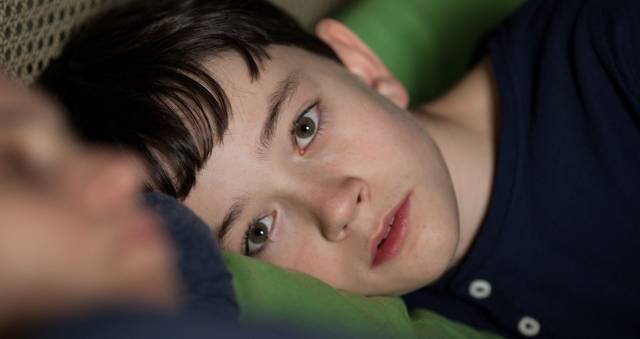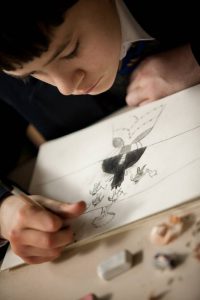

Director J.A. Bayona has a knack for discovering fresh new faces, Roger Princep and Tom Holland, the young actors in The Orphanage and The Impossible respectively, were true revelations who in their film debuts commanded the screen with as much emotion as their more established, adult counterparts. Lewis MacDougall, the young actor at the center of A Monster Calls continues Bayona’s impeccable streak. After a small role in Pan, the British actor headlines Bayona’s moving meditation on mortality and fate, adapted from a novel by Patrick Ness, it tells the story of Conor O’Malley, a young boy dealing with his mother’s (Felicity Jones) terminal cancer, and the prospect of having to move with his severe grandmother (Sigourney Weaver). Things change when Conor learns the ancient tree he can see from his bedroom window, is actually a monster (voiced by Liam Neeson) that comes to life and to his aid when he needs him most.
With expressive eyes and a natural screen presence, MacDougall captures the imagination of audiences who will undoubtedly root for Conor, as he faces challenges that would break any adult. The young actor proves to be particularly splendid in scenes where he is all alone, his body language and precise walk, telling us more than a million words could. As the film opens in theaters I spoke to MacDougall about working with Bayona, accessing Conor’s emotions, and spending time with the other great actors in the film.
When you’re playing a character like Conor who goes through so much pain and is practically in every scene in the movie, what techniques do you use to enter the character’s emotions?
I looked at the experiences in my own life to try and understand what Conor is going through, also there’s the fact that a lot of it comes in the moment, as Conor has to start screaming at the monster for instance, a lot of emotions come out.
J.A. Bayona’s work with young actors is amazing, how was it to work with him?
I felt honored to work with him, something great he did was he used music on the set, different music in between each scene so we would know what the scene was about. That helped me a lot because music can be very powerful at evoking emotion.
How important was it for you to have Patrick Ness around since he wrote the screenplay and the novel. Did he give you insight about Conor that wasn’t in the text?
Having Patrick on set was very helpful, he knows the characters more than anyone else. I’d often talk to him about how Conor wanted to be treated, we had conversations about the character’s guilt and how he seems to want to be punished. When he doesn’t receive the punishment he gets angry.
The scenes with the monster are special effects and green screen, but did you also have the chance to go over them with Liam Neeson?
I did get to do them with Liam, we had 10 days before we started shooting the film, and running the scenes with him was really helpful. When we were actually on set, they made a model of the monster’s face, and having that was helpful.
Growing up did you have any specific monsters you were afraid of?
Definitely, like most kids I feared the monster underneath my bed. The monster Conor encounters is different, because he’s not afraid of him, he’s more confused as to why he’s there.

Conor has to face his own nightmares, did it help you deal with some of your fears as well?
I guess I like to separate it. When I’m shooting I like to think of what Conor’s going through, but definitely it was very therapeutic for me as well. People have told me they cry a lot when they watch the film and I think that’s helpful.
Did you give Conor something that people don’t know about or see in the movie, but that still helped you build the character?
At the end of the shooting I took one of the costume items, the watch, which was very important for him because time is essential for Conor. I had the watch with me at all times, the movie takes about death and how much time we have left.
You’ve done back to back special effects extravaganzas. When you decided to become an actor did you imagine this is how your career would begin?
I never really decided I wanted to be an actor, it just happened to me. I went to a drama group, and got a part in an open casting for Pan, I got an agent and I definitely want to continue acting, but there wasn’t a key moment when I said “I want to be actor”.
Sigourney Weaver was in Aliens, and Felicity Jones is in the new Star Wars, did you have any moments where you geeked out about being with them?
(Laughs) I was very excited the first time I met them, I was very starstruck by them, and Liam as well. I realized that all of them are really nice and down to earth, so that made me relax around them.
Did you talk to them about some of their work you love?
During the filming of A Monster Calls, The Theory of Everything came out, so I talked to Felicity about that. With Liam obviously there’s the Taken movies, but I didn’t get to talk to him about those.
The movie has something really interesting to say about bullying. Why do you think its message is important right now?
Conor’s circumstances are different to a lot of people, Conor feels guilty, so for him the worst thing the bullies can do is stop and ignore him. I definitely think the movie can help people who are suffering from being bullied, but also adults going through loss.
Congrats on being nominated for the Critics Choice awards, are you excited about the prospects of awards?
It’s extremely flattering, I’m honored to be nominated for these things. To be up there with other great names is such an honor.
A Monster Calls opens in theaters on December 23.